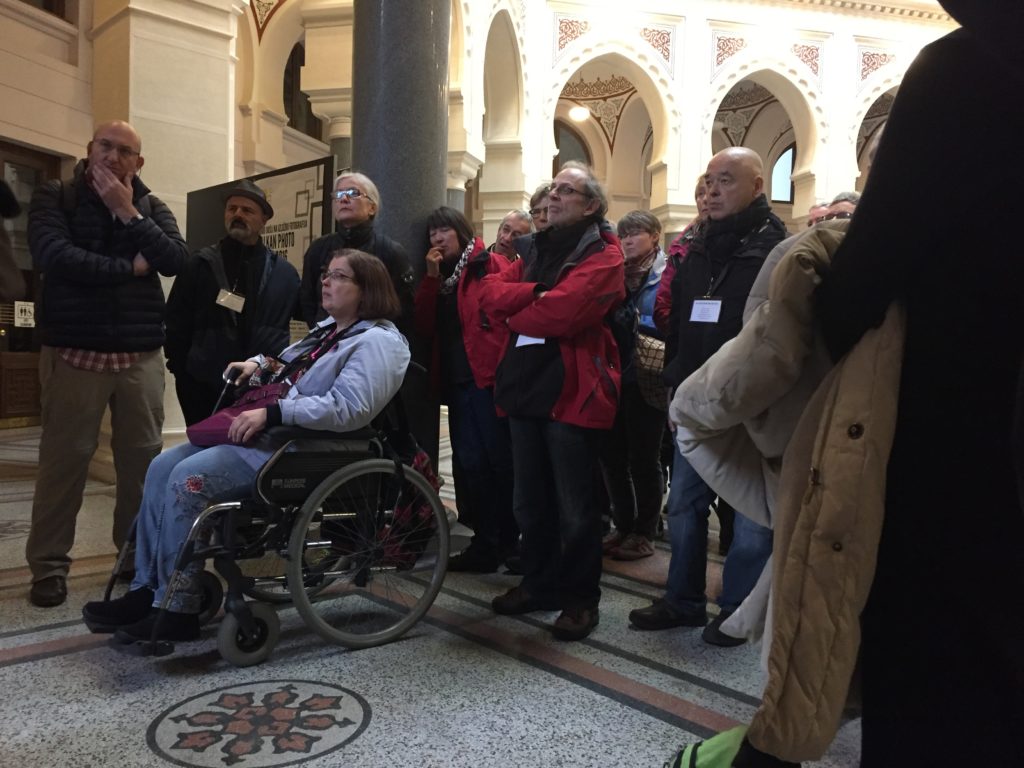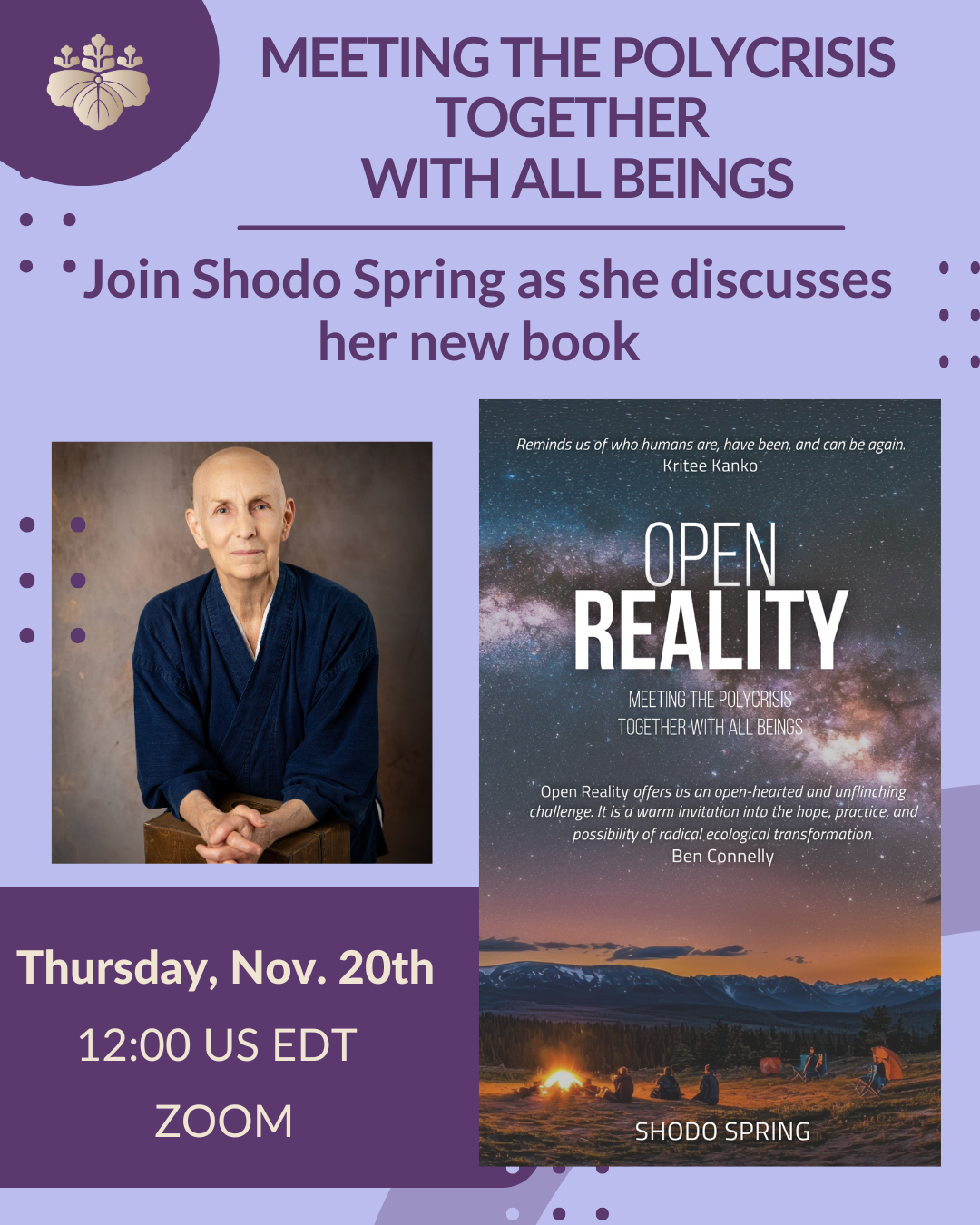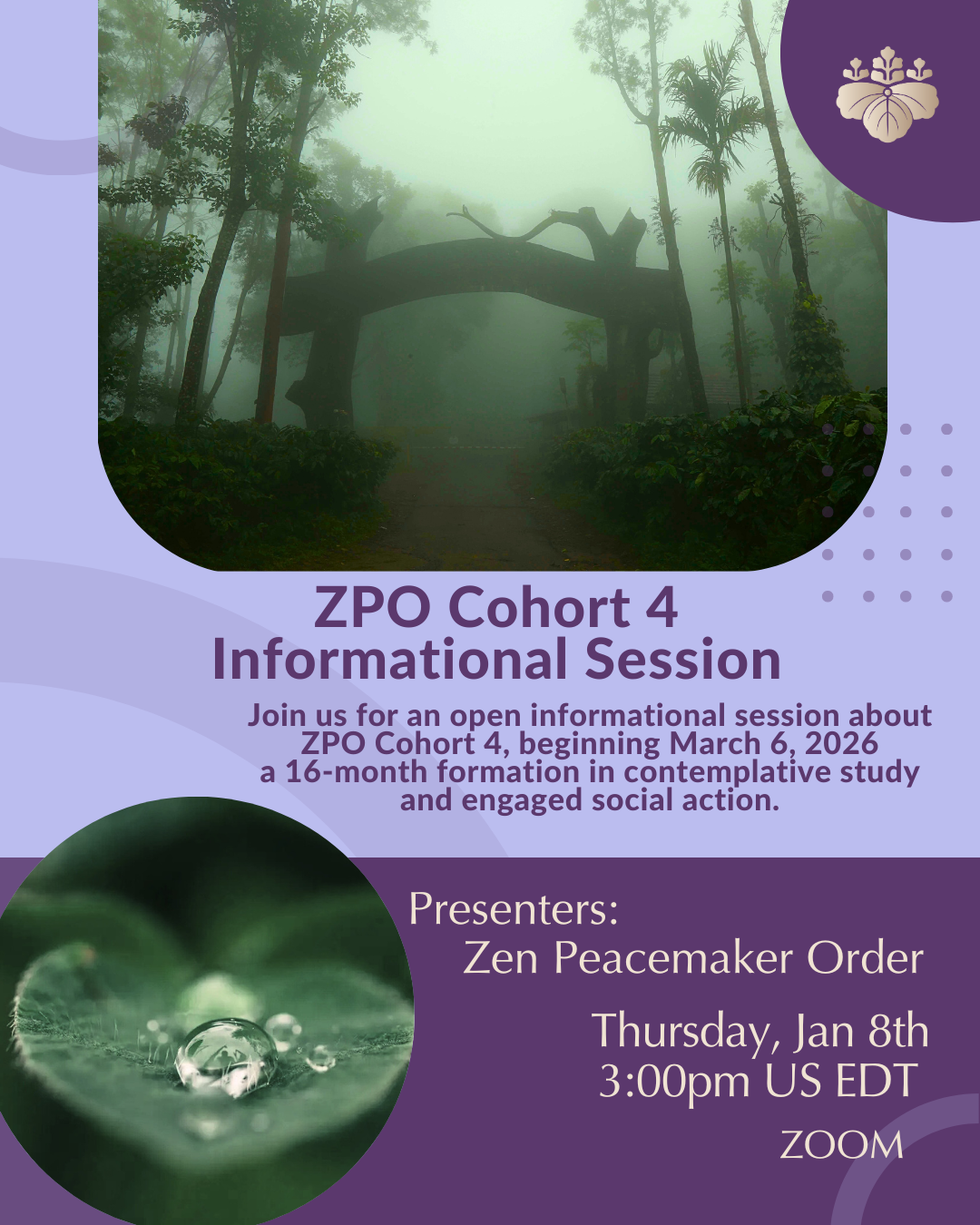Something to Keep Safe
Georgia von Schlieffen reflections on Zen Peacemakers Bearing Witness Retreat in Bosnia-Herzegovina 2017
top: Georgia and the group in the Sarajevo rebuilt library.
BOSNIA & HERZEGOVINA. Until the very last moment, I wasn’t sure if I would be able to join the retreat at all. My cerebral palsy plus an injured ankle due to a fall down the stairs a few months ago made the thought of going almost impossible. But I arrived in Sarajevo nevertheless, thanks to a wonderful Turkish-German taxi driver who carried my luggage down 7 floors. I still felt uneasy because I had started to dream about the Bosnian region. My spirits quickly rose because I met Roshi Frank de Waele and other Zen Peacemakers at Munich airport and enjoyed a wonderful flight over the Alps. On my first day in Sarajevo, the warmth of the hug of the hotel director of Hotel Saraj and such a heartfelt welcome by our Bosnian hosts, Vahidin Omanovic and Mevludin Rahmanovic (Center for Peacebuilding, Sanski Most), made me really happy. I would like to express my utter gratitude for having met this amazing group of Bosnian people.
Monday morning started with a walk to the National Library. The notion of walking made me pass through all the layers of embarrassment, fear, and shame that come along with being a person with a physical disability. For almost seven years at each Zen Buddhist retreat or sesshin, I have had to work through this. To be completely frank, I don’t want to be helped, I don’t want to have to rely on others, and I hate not being “normal” (but doesn’t the word “normal” already have a connotation of violence?) It made me feel weak, and doubt what I could contribute to the group and the whole process.
At the National Library, a guide told how the building and all its content were burnt during the siege. I heard the word “cultural genocide” for the first time in my life. Something deep inside me wanted to cry instantly, but I didn’t let myself cry yet. I was deeply struck by the fact that the cultural heritage was destroyed on purpose and lost forever. Our group continued to walk to the town of Sarajevo. The sun came out and I enjoyed the different smells and the beauty of the town. I appreciated that different religions were able to coexist peacefully together and that churches had been constructed close to mosques. Something started on that first day that would accompany me throughout the whole retreat: the experience of incredible beauty followed almost instantaneously by stories of horror, suffering, and war. To me, the wounds of the city of Sarajevo were so palpable and visibly raw, as if the scar tissue had only just begun to develop.
At Veliki Park, I could hardly bear to look at the monument of the man calling out the name of his son and the monument for killed children. The guide explained to us that the footprints one could see on the monument were taken from the siblings of the killed children. A deep inner urge besieged me: I needed a lipstick, a pink one, as I needed to bring a tender form of beauty into all of this suffering. The color pink symbolizes a very soft feminine side for me, and I was so glad to get a Bosnian pink lipstick. The little I definitively know about my almost 7-year long Zen Buddhist and Zen Peacemakers practice is that it has guided me to my most feminine and vulnerable parts. Never did I have such a longing to wear beautiful clothes and a liking for pastel colors. I have the impression that these deeply feminine and vulnerable parts inside of me want to flourish and be recognized.
The documentary “Miss Sarajevo” showed the will and struggle of the people for life and beauty by showing how they organized a national beauty contest, concerts, and art exhibitions during the siege. After the documentary, we sat in silence and listened to the Muezin’s call for prayer from the near-by Sarajevo mosque. I let myself become absorbed by the voices and carried away. We were welcomed by a sunset from a view at the top looking at the city. This felt magical. Again, so much beauty combined with stories of horror and war.
Later Roshi Frank de Waele explained to us with a tender, almost breaking voice the three tenets, and asked us to breathe in and out. What would await us in this present moment? How far could we go in that practice? A woman’s testimony in the film “Miss Sarajevo” described that she felt abandoned by the other European nations. Frank raised the issue of the role the European countries had played in the war in the former Yugoslavia, and the question whether they should have intervened in the conflict or not.
The next morning, during council practice, I realized that I feel “in between”. I grew up as a person with a physical disability in a completely “non-disabled” environment where the issue of disability was never met with a compassionate heart by my family. The first time I met another disabled person was in my student days. Due to this history, I have carried with me a great amount of pain around the issue of disability. At times, the pain has seemed to be so intense that I have wanted to run away completely from any spiritual practice. I told myself that this would be the last Bearing Witness Retreat that I would ever attend. Moreover, I asked myself how far I could go with showing my vulnerability. Does an “enough is enough” exist?
At Mount Trebevic, we listened to the testimony of a Muslim Bosnian peace activist who survived the siege. Listening to her, I felt hope. Looking down at Sarajevo from Mount Trebevic, I imagined the heavy artillery being launched to bomb the city from this place. Then, we gathered round in a circle to pray and sing together. Listening to the voices praying in different faiths and joining in was beautiful. Then our Bosnian hosts sang the traditional love song “Kad ja podjoh na Bembasu,” cherished by all people in former Yeguslavia across borders and cultures.
In the afternoon, we visited the tunnel and museum in Ildiza. It was dug from within the city and from without and upon completion was the only access of food, medicine and ammunition into Sarajevo, and for evacuation to the outside world. I was surprised how close it was to the Sarajevo airport with planes taking off near-by. The tunnel was built in secret in 1993. The work was done around the clock by hand and the diggers were paid in cigarettes which served as the most common currency during the siege.
I needed assistance using the restroom. It happened that Iris, a Zen Peacemaker from Israel, accompanied me. It was difficult for me due to the intimacy of the moment, yet healing at the same time. Iris and I connect ed in the past over several retreats with the Zen Peacemakers in Auschwitz-Birkenau, and this connection was contrasted by our seemingly colliding background, hers as a Jew and mine as a German, if seen in the historic context of the Jewish holocaust by the Nazis in World-War 2. During this retreat, I learned that taking from people can be more difficult than giving to others. In the past, I had mostly given to people in various forms– the act of giving has always felt easy to me. But I slowly learned to breathe in the joy of taking from people.
The ‘Galerija 11/07/95’ struck me in different ways. This museum is the first gallery in Bosnia-Herzegovina to preserve the memory of the Srebrenica massacre. Photographs on the walls showed the faces of the 8,372 persons who perished there. My thoughts went back to the Auschwitz retreat and the photographs of people in the Auschwitz Museum who were exterminated in the Holocaust. Somehow the faces resembled each other. The photos could show the face of my neighbor next door, a relative, a friend, a brother.
In the evening, we listened to a Roma leader, and I was shocked to hear how much suffering the Roma population has endured over the last decades and the continuing fight for Roma rights. I found it tremendously important to hear his voice and wondered whose voices (also by different minorities living in Bosnia I am not aware of) should be listened to as well besides the voices of the Bosniaks, Serbs and Croats.
On Thursday afternoon, we arrived at the Memorial and UN-compound in Potocari to bear witness to the genocide of Srebrenica where over 8,000 men were executed by Bosnian-Serb forces when they tried to escape the city.
The former UN-compound has been turned into a museum and memorial center. As I entered the vast factory halls where 6,000 people were allowed to seek refuge by the UN soldiers, the heaviness, sadness and desperation inside me grew more and more. It was unbearable to imagine how people struggling for survival were crowded in these halls in an atmosphere of violence; even more inconceivable to imagine the people with small children and elderly people who were forced to stay outside the compound in the heat with no food or water. Words stopped completely. Our guide Hassan took our group to the visitor’s area with a set of TV screens where we watched a film about the events in July 1995. Tani, who often assisted me and a most talented wheelchair pusher, placed the wheelchair very close to the TV screens. The film showed the shooting of men from Srebrenica and surrounding villages by Serbs military and paramilitary units. Sitting that close to the screens, my body protected itself by closing down. I fell asleep for some moments and even fell into a dream state, so that I blocked myself off from the horrors which were shown in the film. However, I was fully awake watching the scene where the two remaining men were forced to carry the dead bodies of the other men and were shot afterwards. In shock, the only thing I wanted to do was to get out. I approached Hassan, our guide, who had survived the genocide and the escape march to Tuzla, and asked him, “Do you feel that it has helped you working here after all what you have been through?” His reply was, “I don’t know.”
Our stay at Potocari ended with an interfaith prayer ceremony and sitting in silence and meditation.
We stayed for an evening meal in Srebrenica. Tension was in the air all the time. The original plans of the Zen Peacemakers to stay in Srebrenica for a few days had been revised. The wounds of war didn’t seem to have healed yet. Due to the fact that I would have had to walk up four floors of stairs, Vahidin asked me to take a seat in the café opposite the restaurant where we were supposed to have dinner. The café wasn’t open, but then the owner opened it for a small group of people who had decided to come with me. With her warm hearted Bosnian hospitality, she served us drinks. After a few minutes, local people joined our group. We were told that they were regulars. We were also permitted to eat our meal that we would receive from the restaurant at her place. I could hardly imagine that such spontaneous hospitality would be possible in Germany for instance. Looking around the city center of Srebrenica, I noticed that quite a number of houses had been abandoned by their owners. The open wounds of this town were so visible. Thinking of the fact that the owner of the café and the other local people all had lost family members and friends in the war made me sad. Different feelings and notions were simultaneously present.
It was getting late and there was still a way ahead of us to get back to Sarajevo. During the long drive, people started to sing songs. I and my Bosnian friends, along with others, joined in to sing Bosnian songs. I felt so happy and nurtured. It was a magic moment of loving kindness!
Afterwards, we visited a Bosnian Serb memorial site. There, I heard stories people missing, of taking DNA samples to identify dead bodies, and the pain of wanting to find missing loved ones. I sensed that each victim of the war and the grief of each person and family member in the former Yugoslavia, whichever side or ethnic group they are a part of, should be acknowledged and mourned. Leaving the memorial, I took the hands of one Bosnian Serb woman and wished her that one day she would find the remains of her loved ones.
Parts of me started to feel sad at the prospect that this beautiful bearing witness retreat would end soon. These feelings were quickly put aside during the final dinner celebrations. These celebrations had another moment of healing in store for me. I danced with some people and felt so natural and easy. I didn’t care about my disability anymore, in contrast to my difficult teenage days when I felt so odd and clumsy, like an outsider.
I went home with a deep sense of gratitude, love, and inner strength. These days in Bosnia will continue to stay in my heart and keep working from there.
To read more reflections from our European Zen Peacemakers’ retreat in Bosnia, see our post from June 30, 2017.
Georgia von Schlieffen is a Zen peacemaker and artist from Germany.



